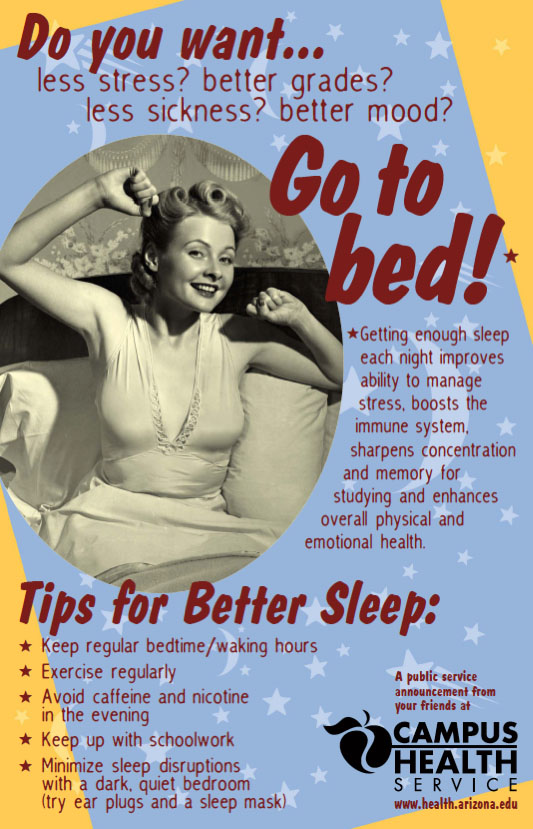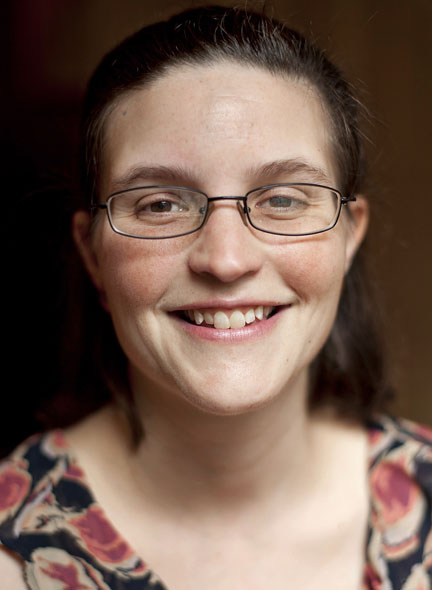
Credit: University of Arizona
For a long list of reasons, college freshmen are often subpar sleepers. A new study by Orzech, now a postdoctoral fellow in sleep research at Brown University, and student health officials at the University of Arizona, illuminates some of the factors undermining sleep. The research published in the current issue of the Journal of American College Health also indicates that college students think their sleep is better than it is and that a campuswide media intervention costing less than $2,500 was able to help nearly 10 percent of students find ways to sleep better.
“Students report a lot of issues with sleep quality and disturbed sleep,” said Orzech, who combined online surveys and more detailed in-person interviews to determine the state of student sleep at the large public university in Tucson. Roommates, dorm noise, fraternity activities, and academic stress make college a novel sleeping environment, she found. “It’s disruptive to their sleep.”
Co-author David Salafsky, director of health promotion and preventive services at Arizona, said the study indicates students are receptive to help.
“Student sleep - or lack thereof - is a health issue that hasn't received the attention it deserves, especially when you begin to consider how interconnected sleep is to other aspects of health,” Salafsky said. “Our findings suggest that this is a topic that students want to hear about and want to talk about.”
The state of sleep
Consistent with other studies, Orzech, Salafsky, and co-author Lee Ann Hamilton found that students often scored poorly on the Pittsburgh Sleep Quality Index, a standardized measure. In results from online surveys of thousands of Arizona students between fall 2005 and spring 2007, the team found that average scores were consistently higher than 5, the level that indicates poor sleep. In fall 2005, for example, male students scored 6.38 on average, while women scored 6.69.

Credit: Mike Cohea/Brown University
Despite their objectively poor scores, seven out of 10 students surveyed described their sleep as “fairly good” or better. The disconnect, Orzech said, may arise from students making comparisons in an environment where poor sleep is common.
In 48 follow-up interviews, as well as the surveys, students acknowledged that poor sleep undermined their memory, concentration, class attendance, mood, and enthusiasm. The study data found a mild correlation between poor sleep and lower grades.
In the context of questions about sleep, many students reported that they had bouts of depression or interpersonal conflict, Orzech said. For those who reported such problems, sleep quality was generally lower.
Salafsky and Orzech said the association of poor sleep with these problems, as well as students’ willingness to acknowledge them, offers an opportunity to campus health professionals.
“We found that sleep can be an important gateway topic for more sensitive health issues such as mental health, itself another pressing issue among college students,” Salafsky said.
“Go to bed”
The team did not just ask about sleep, but also sought to help students. In spring 2006, Salafsky and Hamilton launched a campuswide media campaign consisting of posters, student newspaper advertisements and a “Go to Bed SnoozeLetter” that each delivered information about the health effects of sleep and tips to sleep better.
One poster, for example, advised students to keep regular bedtime and waking hours, to exercise regularly, to avoid caffeine and nicotine in the evening, to keep up with schoolwork, and to minimize sleep disruptions, perhaps by wearing ear plugs and a sleep mask.
“It resonated with people because it’s really simple stuff to do,” Orzech said.
Of 971 students who responded to questions about the campaign, 90 said it helped them sleep better. Their PSQI score dropped, they went to bed earlier, fell asleep faster, and stayed asleep longer.
“From a practitioner standpoint, we learned that a relatively modest health campaign can yield results,” Salafsky said.
Based on interviews conducted as part of the research, Orzech compiled top-five lists of what helped and hindered student sleep:
Helpers
- Taking time to de-stress and unwind
- Creating a room atmosphere conducive to sleep
- Being prepared for the next day
- Eating something
- Exercising
Hindrances
- Dorm noise
- Roommate (both for positive/social reasons and negative reasons)
- Schoolwork
- Having a room atmosphere not conducive to sleep
- Personal health issues
